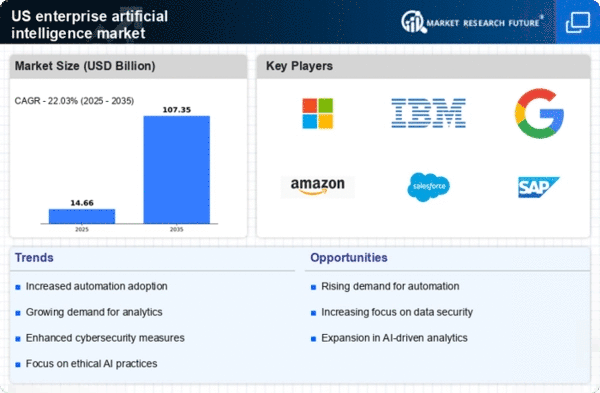Rising Demand for Automation
the enterprise artificial intelligence market is experiencing a notable surge in demand for automation across various sectors. Organizations are increasingly adopting AI technologies to streamline operations, enhance productivity, and reduce operational costs. According to recent data, automation can lead to a reduction in labor costs by up to 30%, which is particularly appealing in competitive industries. This trend is driven by the need for efficiency and the ability to process large volumes of data quickly. As businesses seek to optimize their workflows, the integration of AI solutions becomes essential. the enterprise artificial intelligence market is positioned to grow as companies invest in automation technologies to remain competitive and responsive to market changes.
Growing Focus on Data Security
In the enterprise artificial-intelligence market, the growing focus on data security is a critical driver. As organizations increasingly rely on AI systems to manage sensitive information, the need for robust security measures becomes paramount. Data breaches can cost companies millions, with the average cost of a breach estimated at $3.86 million. This concern prompts businesses to invest in AI-driven security solutions that can proactively identify and mitigate threats. The emphasis on safeguarding data not only protects organizational assets but also builds consumer trust. As a result, the enterprise artificial intelligence market is likely to see increased investment in security technologies that leverage AI to enhance data protection.
Regulatory Support for AI Development
Regulatory support for AI development plays a pivotal role in shaping the enterprise artificial-intelligence market. Governments are increasingly recognizing the potential of AI technologies to drive economic growth and innovation. Initiatives aimed at fostering AI research and development can lead to increased funding and resources for businesses. For example, federal grants and incentives for AI projects can stimulate investment in the sector. This supportive regulatory environment encourages companies to explore AI applications, thereby expanding the enterprise artificial-intelligence market. As regulations evolve to accommodate AI advancements, businesses are likely to benefit from a more conducive landscape for innovation.
Increased Collaboration Between Tech Firms
the enterprise artificial intelligence market is seeing increased collaboration between technology firms and various industries. Partnerships between AI developers and traditional businesses facilitate the integration of AI solutions tailored to specific industry needs. This collaboration can lead to innovative applications of AI, enhancing product offerings and improving customer experiences. For instance, the healthcare sector is leveraging AI for diagnostics and patient management, which can potentially reduce costs by 15% while improving outcomes. Such partnerships are essential for driving the adoption of AI technologies across different sectors, thereby propelling the growth of the enterprise artificial-intelligence market.
Advancements in Machine Learning Algorithms
the enterprise artificial intelligence market is influenced by advancements in machine learning algorithms. These innovations enable organizations to analyze data more effectively, leading to improved decision-making processes. Enhanced algorithms allow for better predictive analytics, which can increase revenue by as much as 20% in some sectors. As companies harness the power of machine learning, they can uncover insights that were previously unattainable. This capability not only drives efficiency but also fosters innovation within organizations. Consequently, the enterprise artificial-intelligence market is likely to expand as businesses prioritize the adoption of cutting-edge machine learning technologies to gain a competitive edge.
.png)
















